Psychosis Nursing Interventions and Management
VerifiedAdded on 2021/04/21
|11
|2120
|113
AI Summary
The provided assignment details the importance of understanding psychosis nursing interventions and management. It includes a meta-analytic review of studies on psychological vs. pharmacological treatment of psychiatric disorders, as well as early detection and intervention strategies for people at risk of psychosis. The assignment also emphasizes the need for stigma reduction and provides information on medications suitable for psychosis, such as fluphenazine and chlorpromazine. Additionally, it highlights the importance of nursing priorities in caring for psychotic patients, including checking triggering factors, presence of suicidal tendency, functional activity, nutritional and hydration status, and promoting participation in group activities. Complementary therapies like cognitive behavioral therapy are also recommended.
Contribute Materials
Your contribution can guide someone’s learning journey. Share your
documents today.
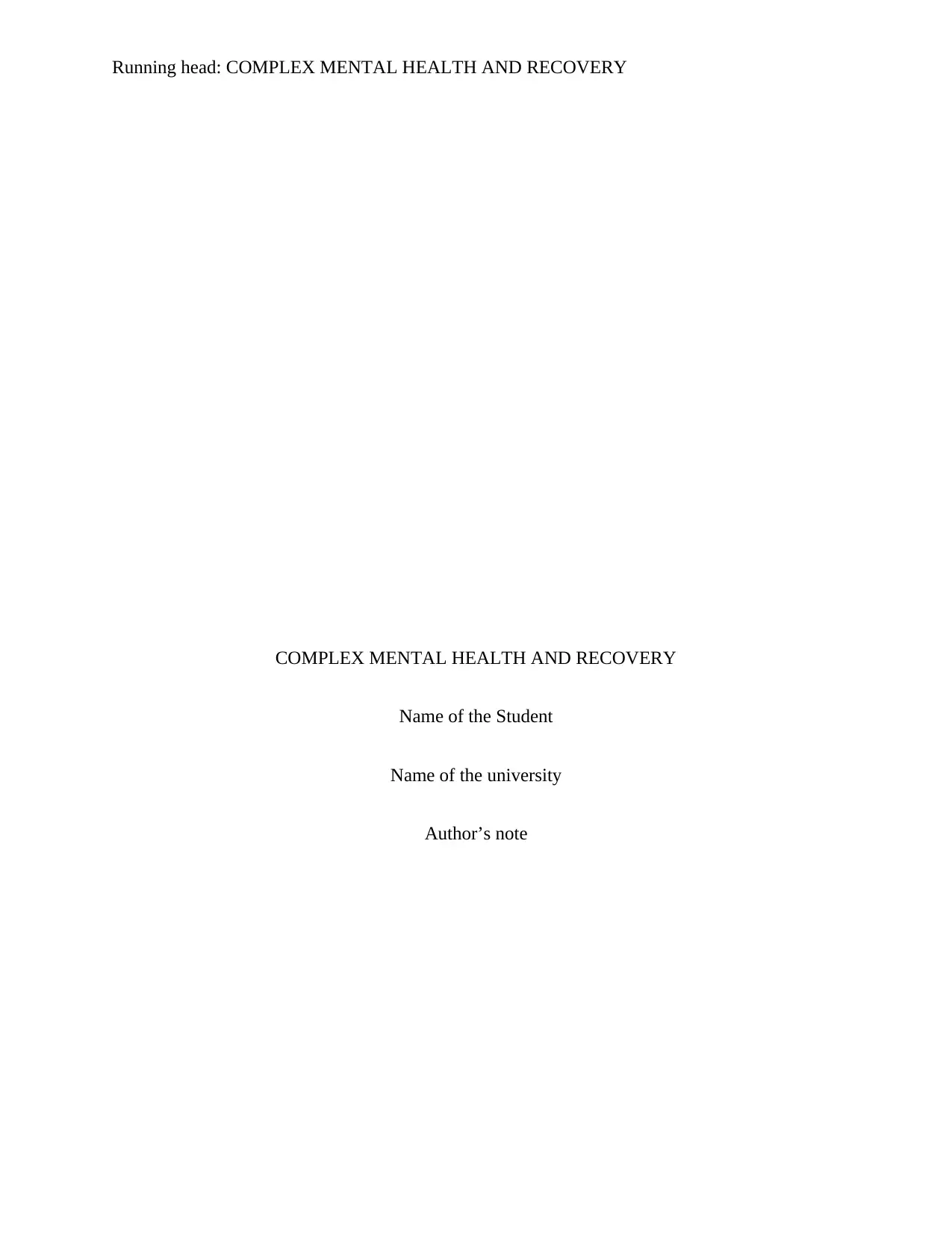
Running head: COMPLEX MENTAL HEALTH AND RECOVERY
COMPLEX MENTAL HEALTH AND RECOVERY
Name of the Student
Name of the university
Author’s note
COMPLEX MENTAL HEALTH AND RECOVERY
Name of the Student
Name of the university
Author’s note
Secure Best Marks with AI Grader
Need help grading? Try our AI Grader for instant feedback on your assignments.
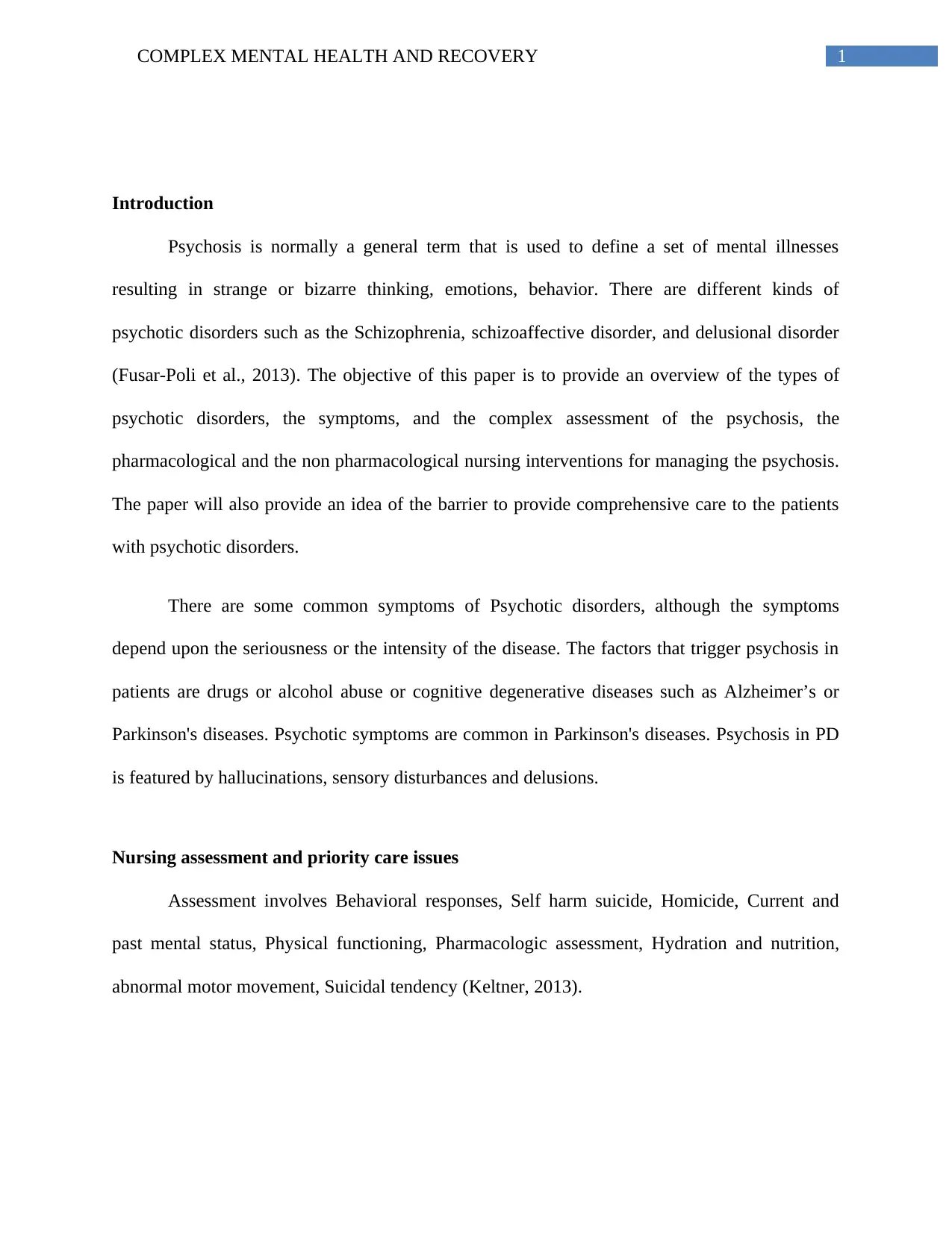
1COMPLEX MENTAL HEALTH AND RECOVERY
Introduction
Psychosis is normally a general term that is used to define a set of mental illnesses
resulting in strange or bizarre thinking, emotions, behavior. There are different kinds of
psychotic disorders such as the Schizophrenia, schizoaffective disorder, and delusional disorder
(Fusar-Poli et al., 2013). The objective of this paper is to provide an overview of the types of
psychotic disorders, the symptoms, and the complex assessment of the psychosis, the
pharmacological and the non pharmacological nursing interventions for managing the psychosis.
The paper will also provide an idea of the barrier to provide comprehensive care to the patients
with psychotic disorders.
There are some common symptoms of Psychotic disorders, although the symptoms
depend upon the seriousness or the intensity of the disease. The factors that trigger psychosis in
patients are drugs or alcohol abuse or cognitive degenerative diseases such as Alzheimer’s or
Parkinson's diseases. Psychotic symptoms are common in Parkinson's diseases. Psychosis in PD
is featured by hallucinations, sensory disturbances and delusions.
Nursing assessment and priority care issues
Assessment involves Behavioral responses, Self harm suicide, Homicide, Current and
past mental status, Physical functioning, Pharmacologic assessment, Hydration and nutrition,
abnormal motor movement, Suicidal tendency (Keltner, 2013).
Introduction
Psychosis is normally a general term that is used to define a set of mental illnesses
resulting in strange or bizarre thinking, emotions, behavior. There are different kinds of
psychotic disorders such as the Schizophrenia, schizoaffective disorder, and delusional disorder
(Fusar-Poli et al., 2013). The objective of this paper is to provide an overview of the types of
psychotic disorders, the symptoms, and the complex assessment of the psychosis, the
pharmacological and the non pharmacological nursing interventions for managing the psychosis.
The paper will also provide an idea of the barrier to provide comprehensive care to the patients
with psychotic disorders.
There are some common symptoms of Psychotic disorders, although the symptoms
depend upon the seriousness or the intensity of the disease. The factors that trigger psychosis in
patients are drugs or alcohol abuse or cognitive degenerative diseases such as Alzheimer’s or
Parkinson's diseases. Psychotic symptoms are common in Parkinson's diseases. Psychosis in PD
is featured by hallucinations, sensory disturbances and delusions.
Nursing assessment and priority care issues
Assessment involves Behavioral responses, Self harm suicide, Homicide, Current and
past mental status, Physical functioning, Pharmacologic assessment, Hydration and nutrition,
abnormal motor movement, Suicidal tendency (Keltner, 2013).
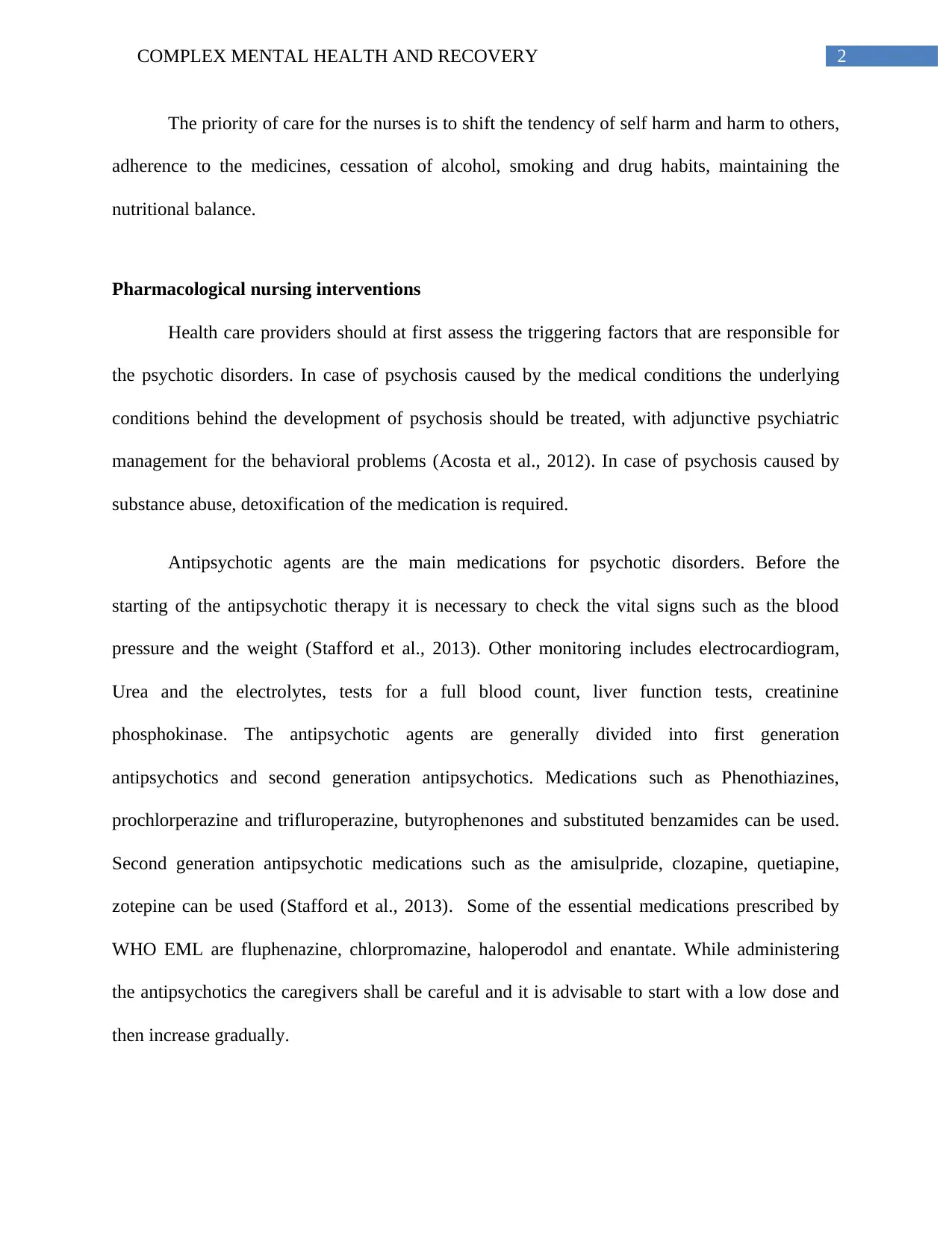
2COMPLEX MENTAL HEALTH AND RECOVERY
The priority of care for the nurses is to shift the tendency of self harm and harm to others,
adherence to the medicines, cessation of alcohol, smoking and drug habits, maintaining the
nutritional balance.
Pharmacological nursing interventions
Health care providers should at first assess the triggering factors that are responsible for
the psychotic disorders. In case of psychosis caused by the medical conditions the underlying
conditions behind the development of psychosis should be treated, with adjunctive psychiatric
management for the behavioral problems (Acosta et al., 2012). In case of psychosis caused by
substance abuse, detoxification of the medication is required.
Antipsychotic agents are the main medications for psychotic disorders. Before the
starting of the antipsychotic therapy it is necessary to check the vital signs such as the blood
pressure and the weight (Stafford et al., 2013). Other monitoring includes electrocardiogram,
Urea and the electrolytes, tests for a full blood count, liver function tests, creatinine
phosphokinase. The antipsychotic agents are generally divided into first generation
antipsychotics and second generation antipsychotics. Medications such as Phenothiazines,
prochlorperazine and trifluroperazine, butyrophenones and substituted benzamides can be used.
Second generation antipsychotic medications such as the amisulpride, clozapine, quetiapine,
zotepine can be used (Stafford et al., 2013). Some of the essential medications prescribed by
WHO EML are fluphenazine, chlorpromazine, haloperodol and enantate. While administering
the antipsychotics the caregivers shall be careful and it is advisable to start with a low dose and
then increase gradually.
The priority of care for the nurses is to shift the tendency of self harm and harm to others,
adherence to the medicines, cessation of alcohol, smoking and drug habits, maintaining the
nutritional balance.
Pharmacological nursing interventions
Health care providers should at first assess the triggering factors that are responsible for
the psychotic disorders. In case of psychosis caused by the medical conditions the underlying
conditions behind the development of psychosis should be treated, with adjunctive psychiatric
management for the behavioral problems (Acosta et al., 2012). In case of psychosis caused by
substance abuse, detoxification of the medication is required.
Antipsychotic agents are the main medications for psychotic disorders. Before the
starting of the antipsychotic therapy it is necessary to check the vital signs such as the blood
pressure and the weight (Stafford et al., 2013). Other monitoring includes electrocardiogram,
Urea and the electrolytes, tests for a full blood count, liver function tests, creatinine
phosphokinase. The antipsychotic agents are generally divided into first generation
antipsychotics and second generation antipsychotics. Medications such as Phenothiazines,
prochlorperazine and trifluroperazine, butyrophenones and substituted benzamides can be used.
Second generation antipsychotic medications such as the amisulpride, clozapine, quetiapine,
zotepine can be used (Stafford et al., 2013). Some of the essential medications prescribed by
WHO EML are fluphenazine, chlorpromazine, haloperodol and enantate. While administering
the antipsychotics the caregivers shall be careful and it is advisable to start with a low dose and
then increase gradually.
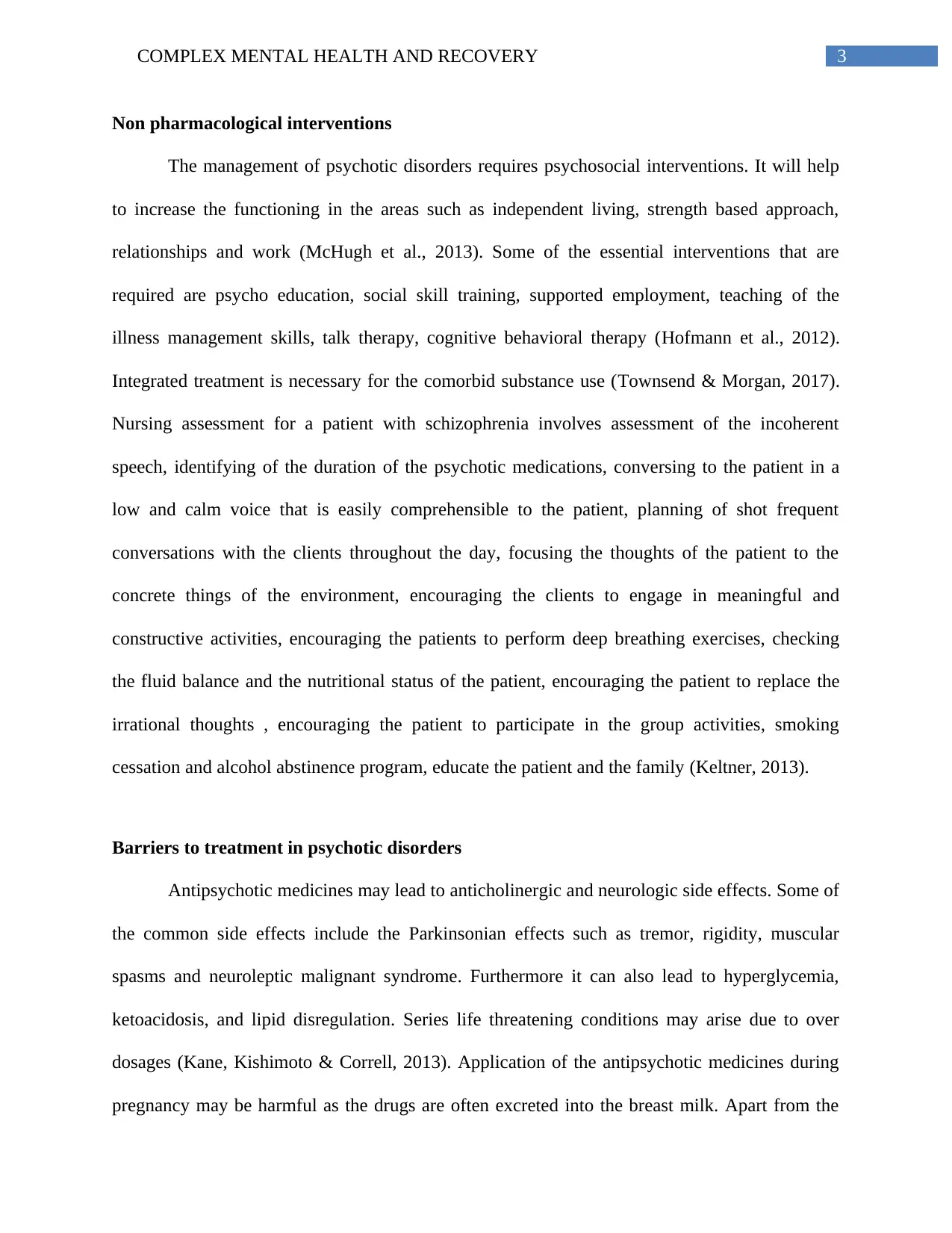
3COMPLEX MENTAL HEALTH AND RECOVERY
Non pharmacological interventions
The management of psychotic disorders requires psychosocial interventions. It will help
to increase the functioning in the areas such as independent living, strength based approach,
relationships and work (McHugh et al., 2013). Some of the essential interventions that are
required are psycho education, social skill training, supported employment, teaching of the
illness management skills, talk therapy, cognitive behavioral therapy (Hofmann et al., 2012).
Integrated treatment is necessary for the comorbid substance use (Townsend & Morgan, 2017).
Nursing assessment for a patient with schizophrenia involves assessment of the incoherent
speech, identifying of the duration of the psychotic medications, conversing to the patient in a
low and calm voice that is easily comprehensible to the patient, planning of shot frequent
conversations with the clients throughout the day, focusing the thoughts of the patient to the
concrete things of the environment, encouraging the clients to engage in meaningful and
constructive activities, encouraging the patients to perform deep breathing exercises, checking
the fluid balance and the nutritional status of the patient, encouraging the patient to replace the
irrational thoughts , encouraging the patient to participate in the group activities, smoking
cessation and alcohol abstinence program, educate the patient and the family (Keltner, 2013).
Barriers to treatment in psychotic disorders
Antipsychotic medicines may lead to anticholinergic and neurologic side effects. Some of
the common side effects include the Parkinsonian effects such as tremor, rigidity, muscular
spasms and neuroleptic malignant syndrome. Furthermore it can also lead to hyperglycemia,
ketoacidosis, and lipid disregulation. Series life threatening conditions may arise due to over
dosages (Kane, Kishimoto & Correll, 2013). Application of the antipsychotic medicines during
pregnancy may be harmful as the drugs are often excreted into the breast milk. Apart from the
Non pharmacological interventions
The management of psychotic disorders requires psychosocial interventions. It will help
to increase the functioning in the areas such as independent living, strength based approach,
relationships and work (McHugh et al., 2013). Some of the essential interventions that are
required are psycho education, social skill training, supported employment, teaching of the
illness management skills, talk therapy, cognitive behavioral therapy (Hofmann et al., 2012).
Integrated treatment is necessary for the comorbid substance use (Townsend & Morgan, 2017).
Nursing assessment for a patient with schizophrenia involves assessment of the incoherent
speech, identifying of the duration of the psychotic medications, conversing to the patient in a
low and calm voice that is easily comprehensible to the patient, planning of shot frequent
conversations with the clients throughout the day, focusing the thoughts of the patient to the
concrete things of the environment, encouraging the clients to engage in meaningful and
constructive activities, encouraging the patients to perform deep breathing exercises, checking
the fluid balance and the nutritional status of the patient, encouraging the patient to replace the
irrational thoughts , encouraging the patient to participate in the group activities, smoking
cessation and alcohol abstinence program, educate the patient and the family (Keltner, 2013).
Barriers to treatment in psychotic disorders
Antipsychotic medicines may lead to anticholinergic and neurologic side effects. Some of
the common side effects include the Parkinsonian effects such as tremor, rigidity, muscular
spasms and neuroleptic malignant syndrome. Furthermore it can also lead to hyperglycemia,
ketoacidosis, and lipid disregulation. Series life threatening conditions may arise due to over
dosages (Kane, Kishimoto & Correll, 2013). Application of the antipsychotic medicines during
pregnancy may be harmful as the drugs are often excreted into the breast milk. Apart from the
Secure Best Marks with AI Grader
Need help grading? Try our AI Grader for instant feedback on your assignments.
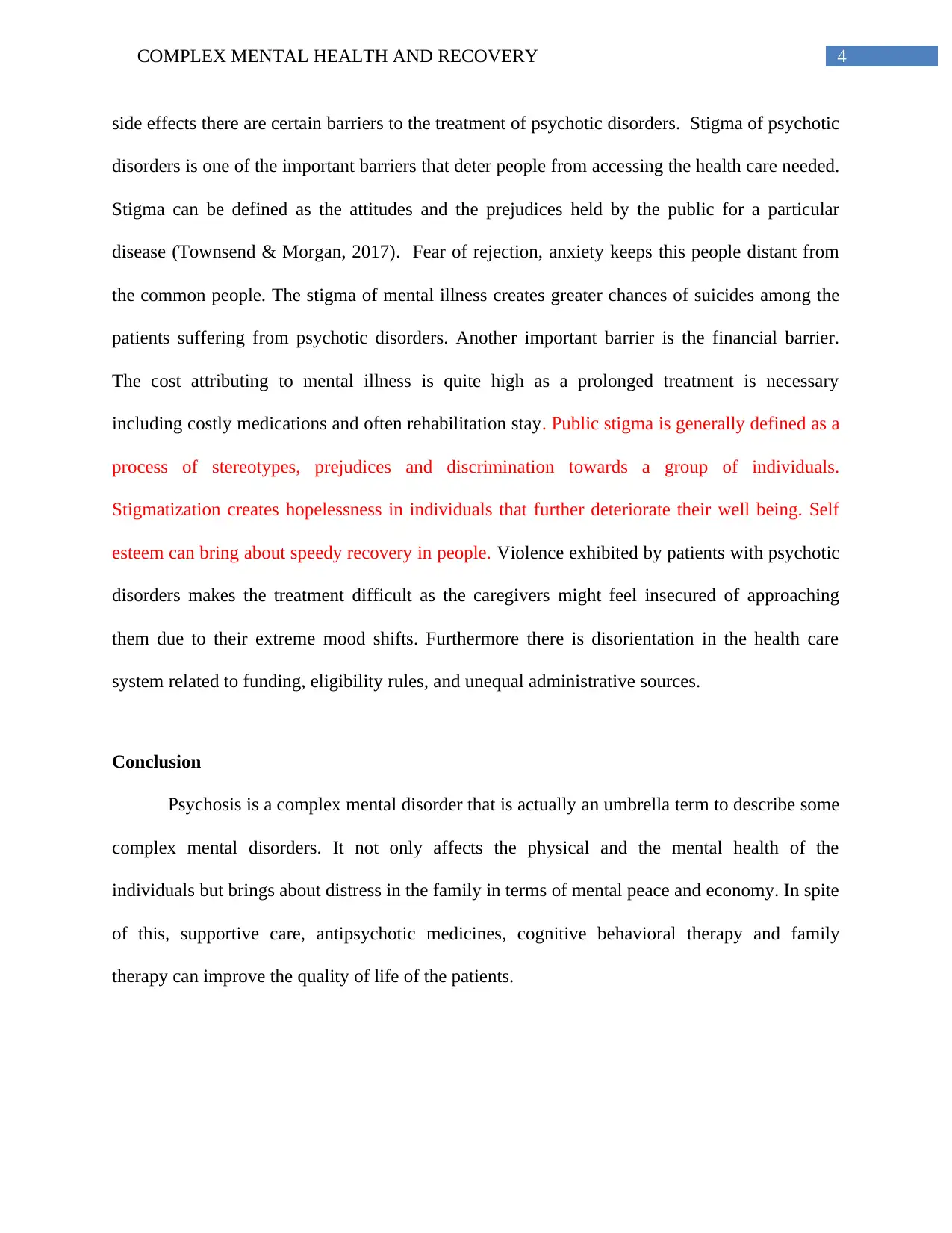
4COMPLEX MENTAL HEALTH AND RECOVERY
side effects there are certain barriers to the treatment of psychotic disorders. Stigma of psychotic
disorders is one of the important barriers that deter people from accessing the health care needed.
Stigma can be defined as the attitudes and the prejudices held by the public for a particular
disease (Townsend & Morgan, 2017). Fear of rejection, anxiety keeps this people distant from
the common people. The stigma of mental illness creates greater chances of suicides among the
patients suffering from psychotic disorders. Another important barrier is the financial barrier.
The cost attributing to mental illness is quite high as a prolonged treatment is necessary
including costly medications and often rehabilitation stay. Public stigma is generally defined as a
process of stereotypes, prejudices and discrimination towards a group of individuals.
Stigmatization creates hopelessness in individuals that further deteriorate their well being. Self
esteem can bring about speedy recovery in people. Violence exhibited by patients with psychotic
disorders makes the treatment difficult as the caregivers might feel insecured of approaching
them due to their extreme mood shifts. Furthermore there is disorientation in the health care
system related to funding, eligibility rules, and unequal administrative sources.
Conclusion
Psychosis is a complex mental disorder that is actually an umbrella term to describe some
complex mental disorders. It not only affects the physical and the mental health of the
individuals but brings about distress in the family in terms of mental peace and economy. In spite
of this, supportive care, antipsychotic medicines, cognitive behavioral therapy and family
therapy can improve the quality of life of the patients.
side effects there are certain barriers to the treatment of psychotic disorders. Stigma of psychotic
disorders is one of the important barriers that deter people from accessing the health care needed.
Stigma can be defined as the attitudes and the prejudices held by the public for a particular
disease (Townsend & Morgan, 2017). Fear of rejection, anxiety keeps this people distant from
the common people. The stigma of mental illness creates greater chances of suicides among the
patients suffering from psychotic disorders. Another important barrier is the financial barrier.
The cost attributing to mental illness is quite high as a prolonged treatment is necessary
including costly medications and often rehabilitation stay. Public stigma is generally defined as a
process of stereotypes, prejudices and discrimination towards a group of individuals.
Stigmatization creates hopelessness in individuals that further deteriorate their well being. Self
esteem can bring about speedy recovery in people. Violence exhibited by patients with psychotic
disorders makes the treatment difficult as the caregivers might feel insecured of approaching
them due to their extreme mood shifts. Furthermore there is disorientation in the health care
system related to funding, eligibility rules, and unequal administrative sources.
Conclusion
Psychosis is a complex mental disorder that is actually an umbrella term to describe some
complex mental disorders. It not only affects the physical and the mental health of the
individuals but brings about distress in the family in terms of mental peace and economy. In spite
of this, supportive care, antipsychotic medicines, cognitive behavioral therapy and family
therapy can improve the quality of life of the patients.
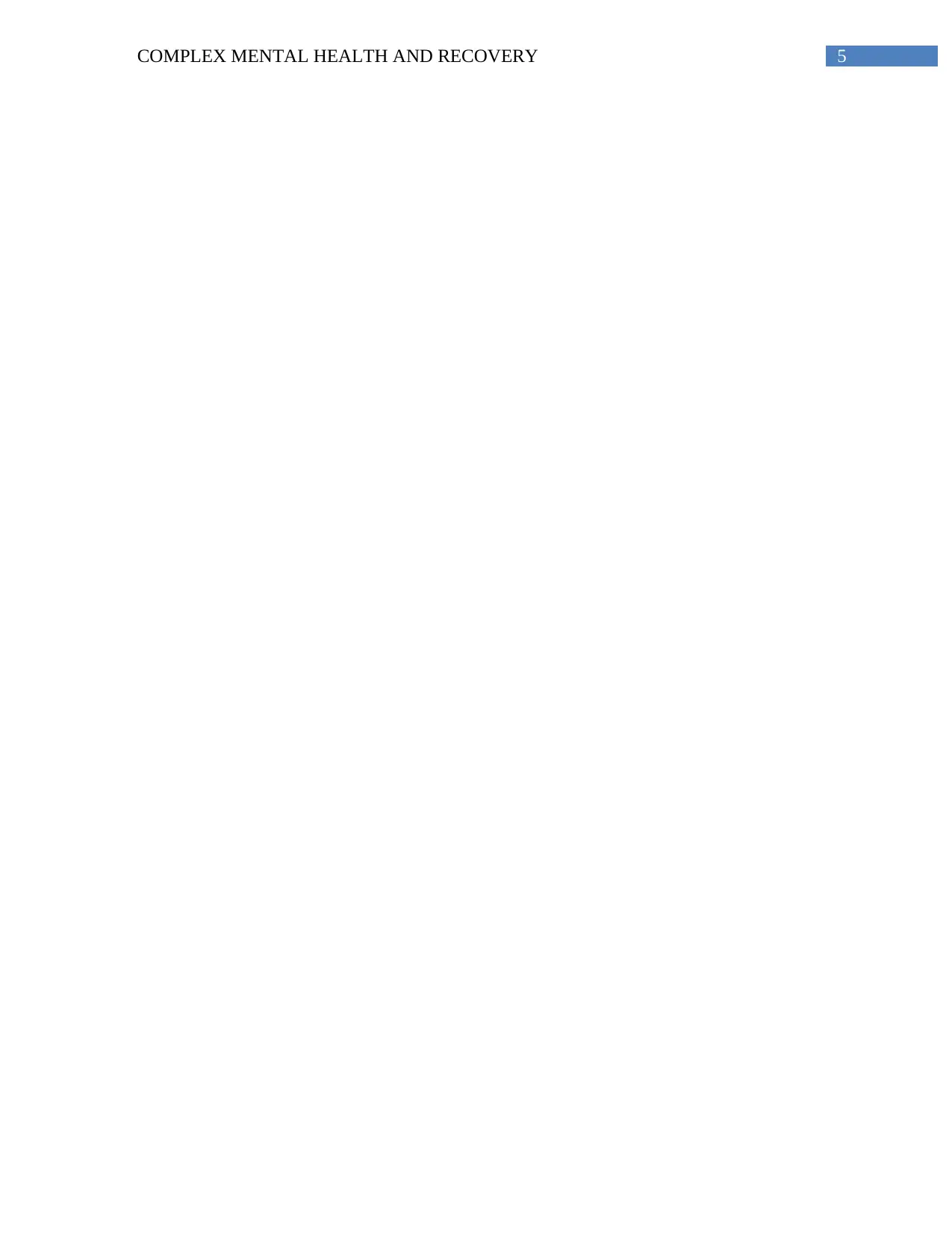
5COMPLEX MENTAL HEALTH AND RECOVERY
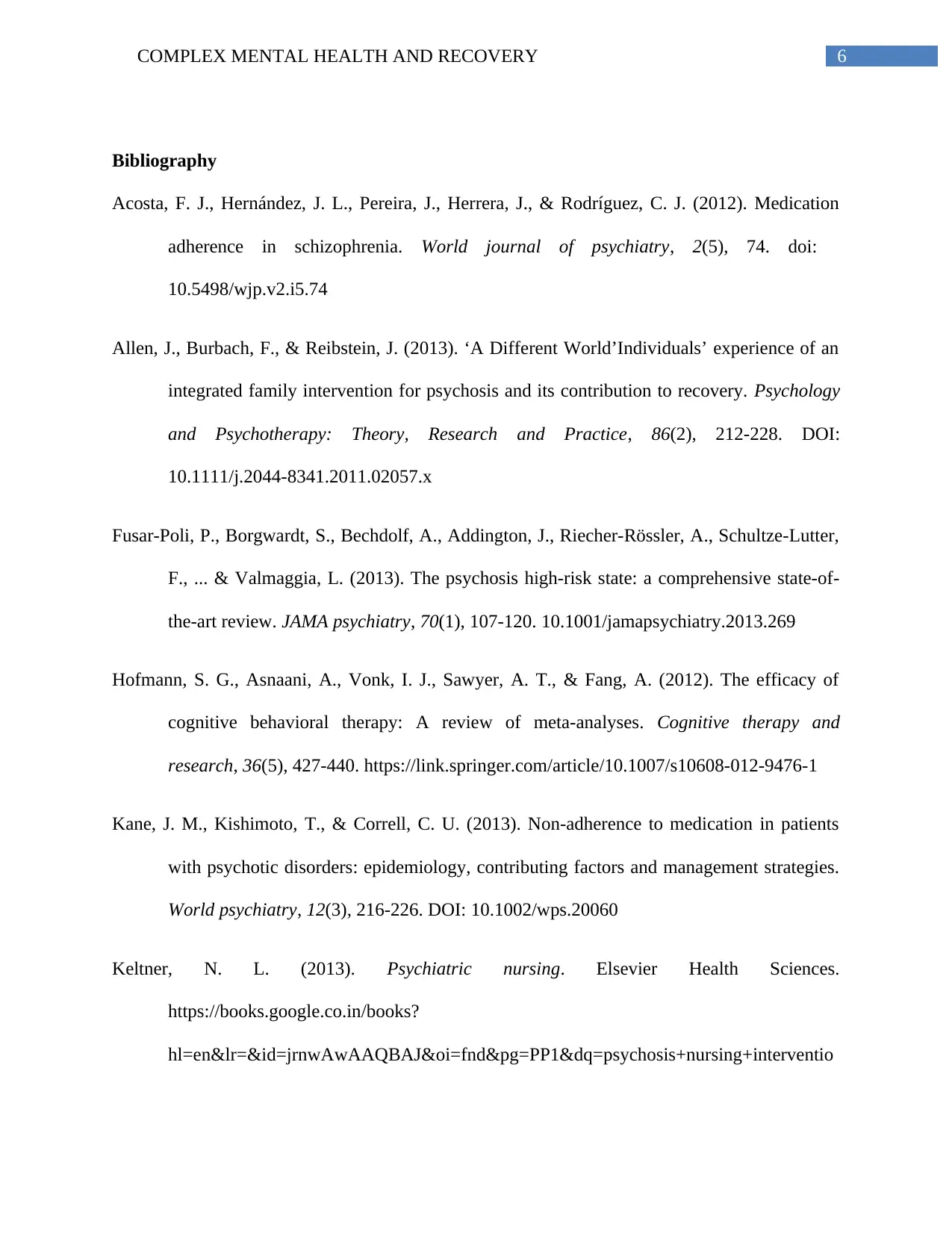
6COMPLEX MENTAL HEALTH AND RECOVERY
Bibliography
Acosta, F. J., Hernández, J. L., Pereira, J., Herrera, J., & Rodríguez, C. J. (2012). Medication
adherence in schizophrenia. World journal of psychiatry, 2(5), 74. doi:
10.5498/wjp.v2.i5.74
Allen, J., Burbach, F., & Reibstein, J. (2013). ‘A Different World’Individuals’ experience of an
integrated family intervention for psychosis and its contribution to recovery. Psychology
and Psychotherapy: Theory, Research and Practice, 86(2), 212-228. DOI:
10.1111/j.2044-8341.2011.02057.x
Fusar-Poli, P., Borgwardt, S., Bechdolf, A., Addington, J., Riecher-Rössler, A., Schultze-Lutter,
F., ... & Valmaggia, L. (2013). The psychosis high-risk state: a comprehensive state-of-
the-art review. JAMA psychiatry, 70(1), 107-120. 10.1001/jamapsychiatry.2013.269
Hofmann, S. G., Asnaani, A., Vonk, I. J., Sawyer, A. T., & Fang, A. (2012). The efficacy of
cognitive behavioral therapy: A review of meta-analyses. Cognitive therapy and
research, 36(5), 427-440. https://link.springer.com/article/10.1007/s10608-012-9476-1
Kane, J. M., Kishimoto, T., & Correll, C. U. (2013). Non‐adherence to medication in patients
with psychotic disorders: epidemiology, contributing factors and management strategies.
World psychiatry, 12(3), 216-226. DOI: 10.1002/wps.20060
Keltner, N. L. (2013). Psychiatric nursing. Elsevier Health Sciences.
https://books.google.co.in/books?
hl=en&lr=&id=jrnwAwAAQBAJ&oi=fnd&pg=PP1&dq=psychosis+nursing+interventio
Bibliography
Acosta, F. J., Hernández, J. L., Pereira, J., Herrera, J., & Rodríguez, C. J. (2012). Medication
adherence in schizophrenia. World journal of psychiatry, 2(5), 74. doi:
10.5498/wjp.v2.i5.74
Allen, J., Burbach, F., & Reibstein, J. (2013). ‘A Different World’Individuals’ experience of an
integrated family intervention for psychosis and its contribution to recovery. Psychology
and Psychotherapy: Theory, Research and Practice, 86(2), 212-228. DOI:
10.1111/j.2044-8341.2011.02057.x
Fusar-Poli, P., Borgwardt, S., Bechdolf, A., Addington, J., Riecher-Rössler, A., Schultze-Lutter,
F., ... & Valmaggia, L. (2013). The psychosis high-risk state: a comprehensive state-of-
the-art review. JAMA psychiatry, 70(1), 107-120. 10.1001/jamapsychiatry.2013.269
Hofmann, S. G., Asnaani, A., Vonk, I. J., Sawyer, A. T., & Fang, A. (2012). The efficacy of
cognitive behavioral therapy: A review of meta-analyses. Cognitive therapy and
research, 36(5), 427-440. https://link.springer.com/article/10.1007/s10608-012-9476-1
Kane, J. M., Kishimoto, T., & Correll, C. U. (2013). Non‐adherence to medication in patients
with psychotic disorders: epidemiology, contributing factors and management strategies.
World psychiatry, 12(3), 216-226. DOI: 10.1002/wps.20060
Keltner, N. L. (2013). Psychiatric nursing. Elsevier Health Sciences.
https://books.google.co.in/books?
hl=en&lr=&id=jrnwAwAAQBAJ&oi=fnd&pg=PP1&dq=psychosis+nursing+interventio
Paraphrase This Document
Need a fresh take? Get an instant paraphrase of this document with our AI Paraphraser
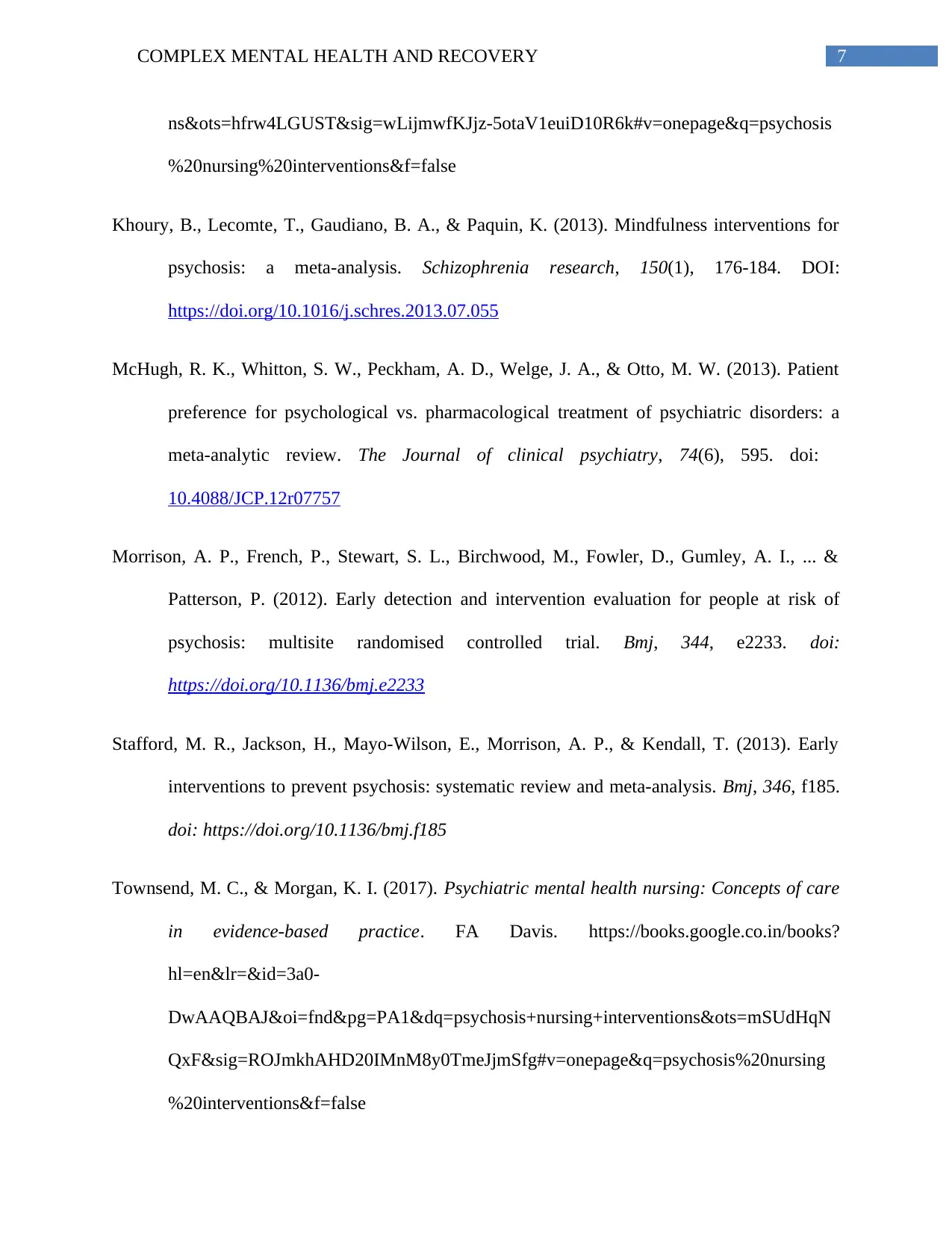
7COMPLEX MENTAL HEALTH AND RECOVERY
ns&ots=hfrw4LGUST&sig=wLijmwfKJjz-5otaV1euiD10R6k#v=onepage&q=psychosis
%20nursing%20interventions&f=false
Khoury, B., Lecomte, T., Gaudiano, B. A., & Paquin, K. (2013). Mindfulness interventions for
psychosis: a meta-analysis. Schizophrenia research, 150(1), 176-184. DOI:
https://doi.org/10.1016/j.schres.2013.07.055
McHugh, R. K., Whitton, S. W., Peckham, A. D., Welge, J. A., & Otto, M. W. (2013). Patient
preference for psychological vs. pharmacological treatment of psychiatric disorders: a
meta-analytic review. The Journal of clinical psychiatry, 74(6), 595. doi:
10.4088/JCP.12r07757
Morrison, A. P., French, P., Stewart, S. L., Birchwood, M., Fowler, D., Gumley, A. I., ... &
Patterson, P. (2012). Early detection and intervention evaluation for people at risk of
psychosis: multisite randomised controlled trial. Bmj, 344, e2233. doi:
https://doi.org/10.1136/bmj.e2233
Stafford, M. R., Jackson, H., Mayo-Wilson, E., Morrison, A. P., & Kendall, T. (2013). Early
interventions to prevent psychosis: systematic review and meta-analysis. Bmj, 346, f185.
doi: https://doi.org/10.1136/bmj.f185
Townsend, M. C., & Morgan, K. I. (2017). Psychiatric mental health nursing: Concepts of care
in evidence-based practice. FA Davis. https://books.google.co.in/books?
hl=en&lr=&id=3a0-
DwAAQBAJ&oi=fnd&pg=PA1&dq=psychosis+nursing+interventions&ots=mSUdHqN
QxF&sig=ROJmkhAHD20IMnM8y0TmeJjmSfg#v=onepage&q=psychosis%20nursing
%20interventions&f=false
ns&ots=hfrw4LGUST&sig=wLijmwfKJjz-5otaV1euiD10R6k#v=onepage&q=psychosis
%20nursing%20interventions&f=false
Khoury, B., Lecomte, T., Gaudiano, B. A., & Paquin, K. (2013). Mindfulness interventions for
psychosis: a meta-analysis. Schizophrenia research, 150(1), 176-184. DOI:
https://doi.org/10.1016/j.schres.2013.07.055
McHugh, R. K., Whitton, S. W., Peckham, A. D., Welge, J. A., & Otto, M. W. (2013). Patient
preference for psychological vs. pharmacological treatment of psychiatric disorders: a
meta-analytic review. The Journal of clinical psychiatry, 74(6), 595. doi:
10.4088/JCP.12r07757
Morrison, A. P., French, P., Stewart, S. L., Birchwood, M., Fowler, D., Gumley, A. I., ... &
Patterson, P. (2012). Early detection and intervention evaluation for people at risk of
psychosis: multisite randomised controlled trial. Bmj, 344, e2233. doi:
https://doi.org/10.1136/bmj.e2233
Stafford, M. R., Jackson, H., Mayo-Wilson, E., Morrison, A. P., & Kendall, T. (2013). Early
interventions to prevent psychosis: systematic review and meta-analysis. Bmj, 346, f185.
doi: https://doi.org/10.1136/bmj.f185
Townsend, M. C., & Morgan, K. I. (2017). Psychiatric mental health nursing: Concepts of care
in evidence-based practice. FA Davis. https://books.google.co.in/books?
hl=en&lr=&id=3a0-
DwAAQBAJ&oi=fnd&pg=PA1&dq=psychosis+nursing+interventions&ots=mSUdHqN
QxF&sig=ROJmkhAHD20IMnM8y0TmeJjmSfg#v=onepage&q=psychosis%20nursing
%20interventions&f=false
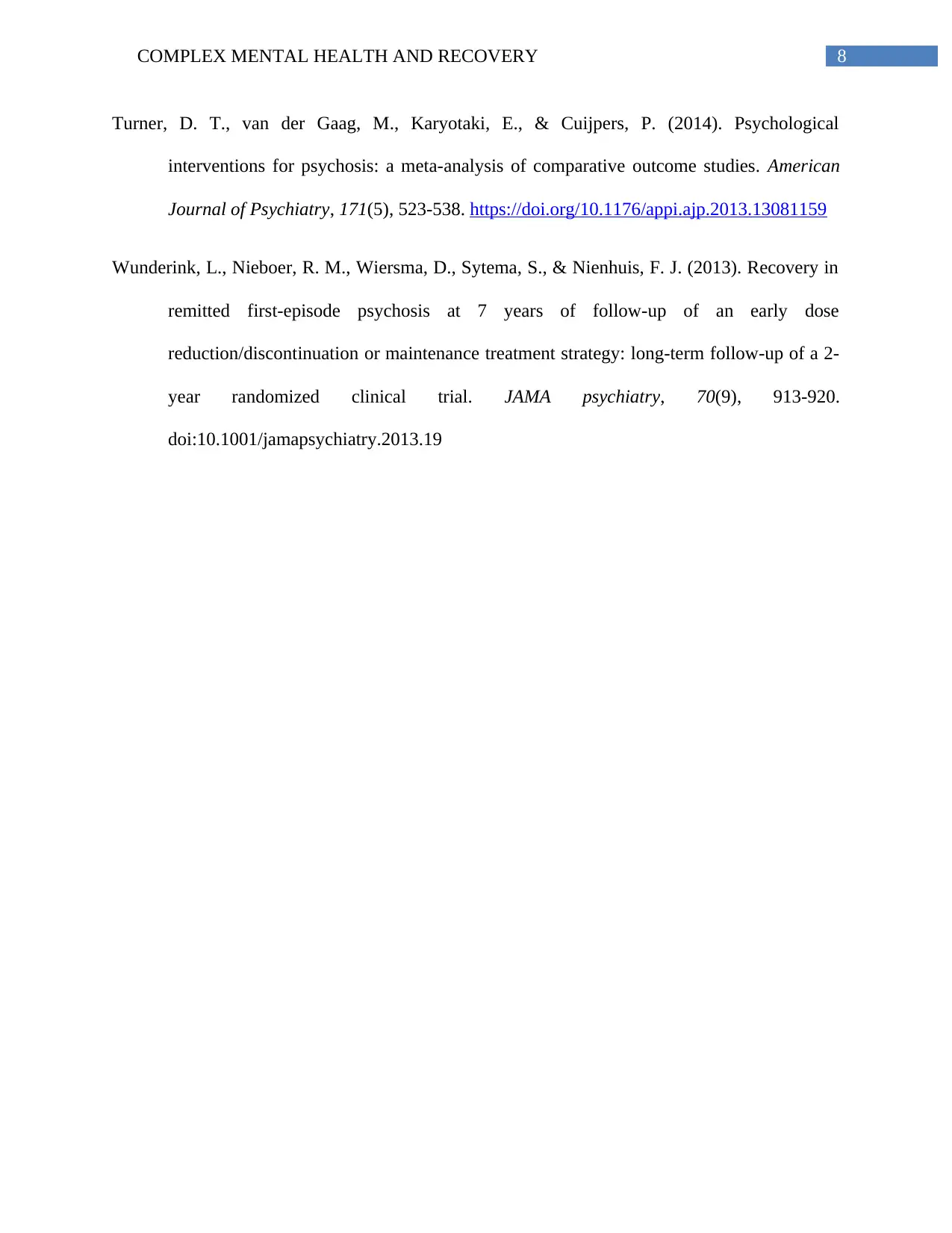
8COMPLEX MENTAL HEALTH AND RECOVERY
Turner, D. T., van der Gaag, M., Karyotaki, E., & Cuijpers, P. (2014). Psychological
interventions for psychosis: a meta-analysis of comparative outcome studies. American
Journal of Psychiatry, 171(5), 523-538. https://doi.org/10.1176/appi.ajp.2013.13081159
Wunderink, L., Nieboer, R. M., Wiersma, D., Sytema, S., & Nienhuis, F. J. (2013). Recovery in
remitted first-episode psychosis at 7 years of follow-up of an early dose
reduction/discontinuation or maintenance treatment strategy: long-term follow-up of a 2-
year randomized clinical trial. JAMA psychiatry, 70(9), 913-920.
doi:10.1001/jamapsychiatry.2013.19
Turner, D. T., van der Gaag, M., Karyotaki, E., & Cuijpers, P. (2014). Psychological
interventions for psychosis: a meta-analysis of comparative outcome studies. American
Journal of Psychiatry, 171(5), 523-538. https://doi.org/10.1176/appi.ajp.2013.13081159
Wunderink, L., Nieboer, R. M., Wiersma, D., Sytema, S., & Nienhuis, F. J. (2013). Recovery in
remitted first-episode psychosis at 7 years of follow-up of an early dose
reduction/discontinuation or maintenance treatment strategy: long-term follow-up of a 2-
year randomized clinical trial. JAMA psychiatry, 70(9), 913-920.
doi:10.1001/jamapsychiatry.2013.19
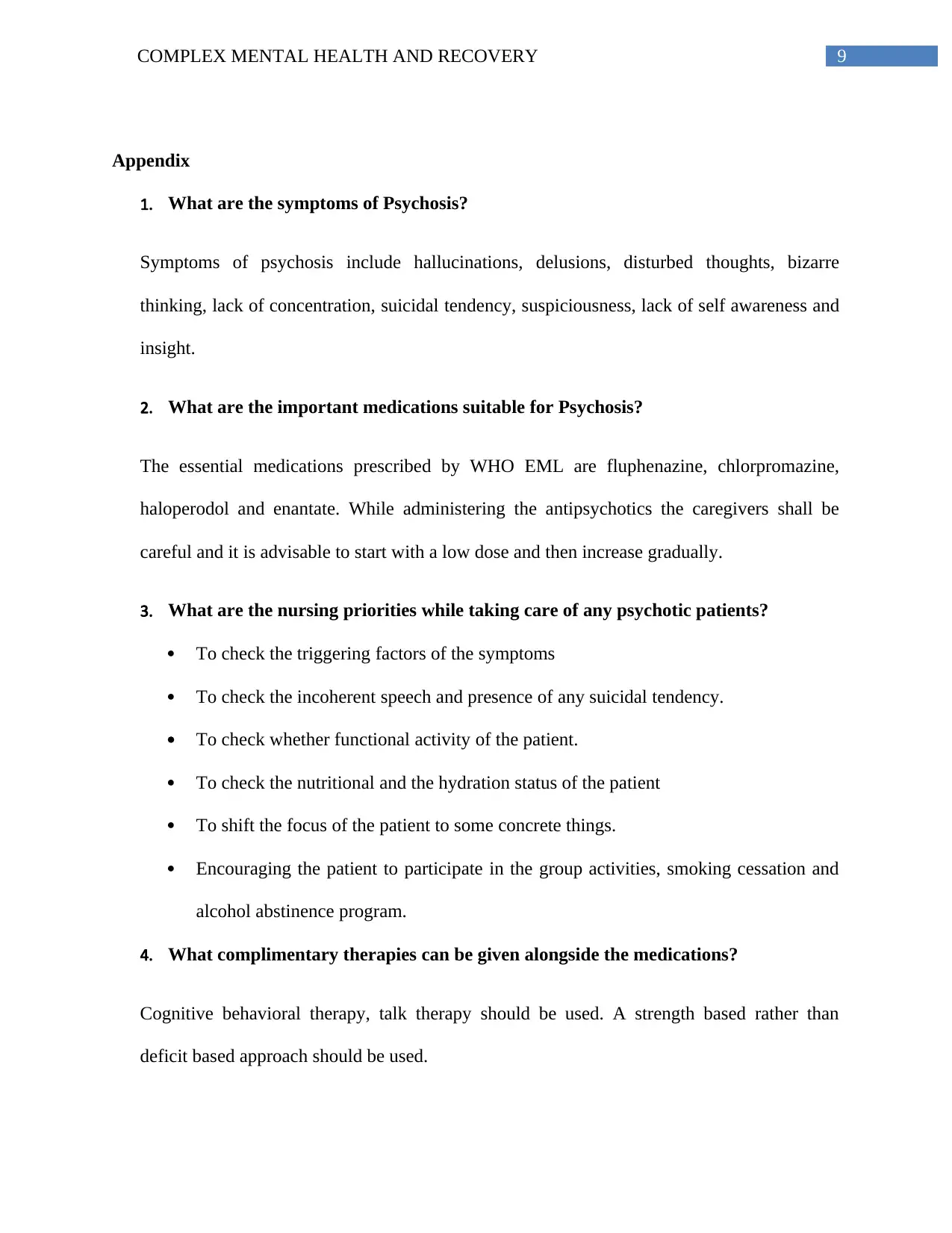
9COMPLEX MENTAL HEALTH AND RECOVERY
Appendix
1. What are the symptoms of Psychosis?
Symptoms of psychosis include hallucinations, delusions, disturbed thoughts, bizarre
thinking, lack of concentration, suicidal tendency, suspiciousness, lack of self awareness and
insight.
2. What are the important medications suitable for Psychosis?
The essential medications prescribed by WHO EML are fluphenazine, chlorpromazine,
haloperodol and enantate. While administering the antipsychotics the caregivers shall be
careful and it is advisable to start with a low dose and then increase gradually.
3. What are the nursing priorities while taking care of any psychotic patients?
To check the triggering factors of the symptoms
To check the incoherent speech and presence of any suicidal tendency.
To check whether functional activity of the patient.
To check the nutritional and the hydration status of the patient
To shift the focus of the patient to some concrete things.
Encouraging the patient to participate in the group activities, smoking cessation and
alcohol abstinence program.
4. What complimentary therapies can be given alongside the medications?
Cognitive behavioral therapy, talk therapy should be used. A strength based rather than
deficit based approach should be used.
Appendix
1. What are the symptoms of Psychosis?
Symptoms of psychosis include hallucinations, delusions, disturbed thoughts, bizarre
thinking, lack of concentration, suicidal tendency, suspiciousness, lack of self awareness and
insight.
2. What are the important medications suitable for Psychosis?
The essential medications prescribed by WHO EML are fluphenazine, chlorpromazine,
haloperodol and enantate. While administering the antipsychotics the caregivers shall be
careful and it is advisable to start with a low dose and then increase gradually.
3. What are the nursing priorities while taking care of any psychotic patients?
To check the triggering factors of the symptoms
To check the incoherent speech and presence of any suicidal tendency.
To check whether functional activity of the patient.
To check the nutritional and the hydration status of the patient
To shift the focus of the patient to some concrete things.
Encouraging the patient to participate in the group activities, smoking cessation and
alcohol abstinence program.
4. What complimentary therapies can be given alongside the medications?
Cognitive behavioral therapy, talk therapy should be used. A strength based rather than
deficit based approach should be used.
Secure Best Marks with AI Grader
Need help grading? Try our AI Grader for instant feedback on your assignments.
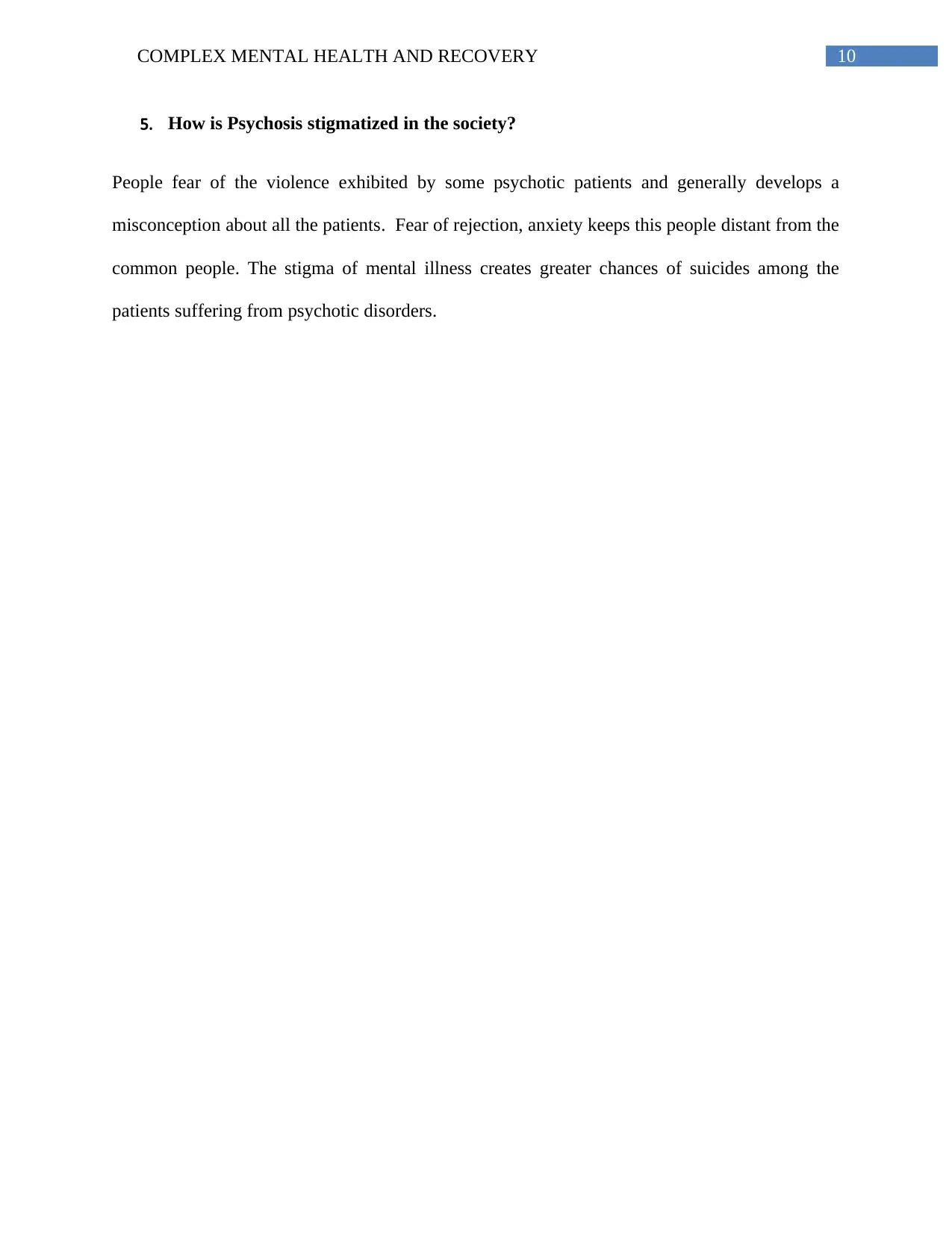
10COMPLEX MENTAL HEALTH AND RECOVERY
5. How is Psychosis stigmatized in the society?
People fear of the violence exhibited by some psychotic patients and generally develops a
misconception about all the patients. Fear of rejection, anxiety keeps this people distant from the
common people. The stigma of mental illness creates greater chances of suicides among the
patients suffering from psychotic disorders.
5. How is Psychosis stigmatized in the society?
People fear of the violence exhibited by some psychotic patients and generally develops a
misconception about all the patients. Fear of rejection, anxiety keeps this people distant from the
common people. The stigma of mental illness creates greater chances of suicides among the
patients suffering from psychotic disorders.
1 out of 11
Related Documents
Your All-in-One AI-Powered Toolkit for Academic Success.
+13062052269
info@desklib.com
Available 24*7 on WhatsApp / Email
![[object Object]](/_next/static/media/star-bottom.7253800d.svg)
Unlock your academic potential
© 2024 | Zucol Services PVT LTD | All rights reserved.





